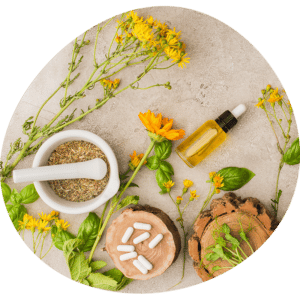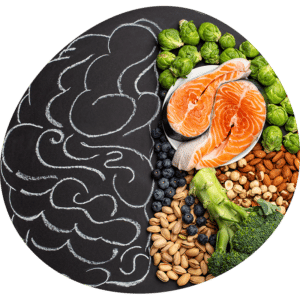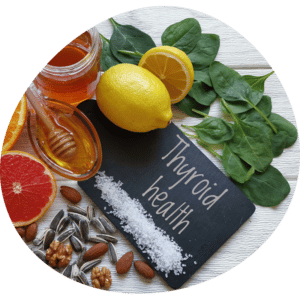Many clients come to me with all the textbook symptoms of hypothyroidism, however, they have been to their doctor who says their thyroid function is normal.
A doctor is testing for frank hypothyroidism which requires medication and is diagnosed when TSH (Thyroid Stimulating Hormone) levels rise above the standard reference range. TSH is a hormone secreted by the pituitary gland in your brain which measures how strongly the brain is signalling your thyroid to make T4, a largely inactive thyroid hormone, which is then converted into T3 or reverse T3 in the liver and kidneys. T3 then locks into cellular receptors and activates the metabolism within the cell.
Reverse T3 is a mirror image of the active hormone T3 which has the ability to lock into receptors without the metabolism-inducing effects of T3 – essentially it forms a plug on the receptor, and the cell remains dormant. As you can see from the biochemical flow, there is the potential for low T4 or T3, improper conversion due to suboptimal liver or kidney health and cell receptor issues.
Signs of hypothyroidism include:
- Feeling the cold, cold hands and feet and poor circulation.
- Weight gain and an inability to lose the weight. Commonly this is accompanied by low appetite and a low calorie intake due to poor appetite.
- Constipation, incomplete bowel emptying, inability to use the bowel without a coffee in the morning or some other help to get the bowel moving.
- Puffiness and fluid retention.
- Headaches, joint pain, sore muscles, fibromyalgia like symptoms.
- Brain fog and fatigue which can feel mental and physical – clients explain it to be like a lead weight being carried around. Many clients explain the sensation as burn out, overwhelm and an inability to remember or think of words.
- Depression, low mood and a lack of motivation.
- Heavy menses and fertility concerns. Many will complain of ovarian pain mid cycle and/or hard/painful/lumpy breasts, especially around pre-menstrual time.
- Low basal body temperature.
The medical profession testing TSH only, does not tell you what sort of hormonal output your thyroid is capable of. To get a full picture, you need T4, T3, reverse T3 and thyroid antibody tires. Here’s why:
T4 is the starting point of the thyroid hormone cascade. It is largely inactive. It is made up of 1 tyrosine molecule attached to 4 iodine molecules. If this is low, I generally advise clients to bump up their intake of protein and iodine rich foods like seaweeds (nori, wakame, dulse) and iodised seal salt. T4 is then converted into the active thyroid hormone T3 or the inactive isomer (mirror image) reverse T3 inside the liver or kidneys. For this to occur optimally, we need good liver and kidney health.
Ways to improve liver health include:
- Lemon water in the morning upon rising – add the juice of a lemon to room temperature water and drink on an empty stomach. Lemon is acidic, so please consume through a metal straw to avoid the tooth enamel. Lemon can be substituted with a tablespoon of apple cider vinegar.
- Cruciferous vegetables – a cup daily. It is important to consume cruciferous vegetables with iodine as they can have a goitrogenic effect by inhibiting the thyroids iodine uptake. Consuming iodine (such as iodised salt) with goitrogenic foods such as soy and cruciferous vegetables will mitigate the adverse effect of these foods on iodine uptake. Cruciferous vegetables include kale, broccoli, broccolini, brussels sprouts and watercress.
- Bitter foods stimulate the digestion and liver and have a beneficial effect on the immune system which is useful in autoimmune thyroiditis. Bitters include rocket, arugula, bitter melon, citrus, cranberries, cocoa, coffee, green tea and the cruciferous vegetables above.
- Include turmeric in the diet regularly – curries, juices, smoothies, chai latte, turmeric latte are some of my favourite recommendations.
- Herbal medicines can also help improve liver function, however these are best prescribed specifically to you in a naturopathic consultation.
Ways to improve kidney health:
- Drink 2 litres of filtered water daily (reverse osmosis which has not been remineralised is best).
- Celery and parsley juice
- Chlorella, spirulina, wheatgrass are alkalisers and alkalisers promote toxin excretion via the kidney. Green leafy vegetables will also have an alkalising effect on the urine and therefore improve toxin clearance.
- Herbal medicines can also help improve kidney function, however these are best prescribed specifically to you in a naturopathic consultation.
Once the T4 goes via the kidney or liver, it becomes T3 or reverse T3. This conversion happens under the influence of zinc and selenium.
Ways to improve your zinc status are:
- Reverse osmosis water filtration which has not been remineralised to remove all copper accumulation from drinking water – most of us are copper toxic due to copper water pipes in our plumbing.
- Zinc rich foods should be included in the diet regularly. The best sources of zinc include oysters, red meat, shellfish, eggs, wholegrains and legumes.
- Zinc supplementation is always required when copper is high and/or T3 is low. A hair tissue mineral analysis is the best way to uncover this information. This should be done under the guidance of a Naturopath who knows how to properly interpret these tests, as a lot of information can be uncovered from this type of testing. Classic copper overload symptoms in women are heavy menses and PMT.
Ways to improve selenium status include:
- Brazil Nuts
- Wholegrains
- Meat
- Eggs
- Sunflower seeds
- Lentils
- Mushrooms
- Bananas
- Cashews
The conversion of T4 to T3 also requires progesterone, therefore to have optimal thyroid health, your hormones need to be balanced. To evaluate this adequately, please speak to me about a DUTCH test or salivary hormone test. There are excellent natural ways to balance your hormones which include various herbs and nutrients depending on the specific imbalance. The conversion of T4 to T3 is a highly inflammatory metabolic process, therefore antioxidants are required to quench the free radicals which are produced during the conversion. The best way to boost your antioxidant status is to eat a diet full of colourful, organic (preferably) fruits and vegetables. 9 plus servings per day is best.
As mentioned previously, T4 can also be converted to reverse T3. Reverse T3 conversion is increased when the system is under a type of stress. This stress can include:
- Psychological stress
- Infections
- Inflammation
- Low calorie diets
- Lack of exercise
- Toxicity, particularly heavy metals such as mercury. These can be assessed via a hair tissue mineral analysis as discussed under the copper section of this piece.
- Food intolerances – the number one culprit of thyroid disease is gluten.
Once the thyroid hormones are adequately converted into T3, the T3 then needs to lock into a healthy receptor. Healthy receptors need Vitamin D and Vitamin A to work optimally. They also need to not be damaged by bromides. Bromides are unfortunately pervasive in our environment and come in the form of:
- Brominated fire retardants in furniture – particularly mattresses which we lay upon for 8 hours each evening. Buy a natural latex mattress when it’s time to upgrade. I love the Peace Lilly brand.
- Brominated flours are used in bread baking.
- Air pollution can contain bromides – particularly where there is burning or fumes or dust.
- Chlorine can also act similarly to bromides and block receptors, therefore swimming in the ocean or a salt water pool is best. If you regularly use a chlorinated pool, please ensure you use a barrier cream on your body before getting into the pool and wash yourself off immediately afterwards. Public pools can also be a source of copper exposure, as many use a copper based fungicide.
Please note that having a diet sufficient in iodine will help protect the thyroid and receptors from bromides and other halogens such as chlorine and occasional nicotine exposure via passive smoking. If you are a smoker – this is one of the worst things you can do for your thyroid as they are a cocktail of hallogenic nicotine and various heavy metals which are all thyrotoxins. Smoking is a source of free radical damage and the thyroid is very sensitive to toxins of any form.
The last thing that can adversely affect the thyroid is autoimmunity. This is a complex state, as it means there is immune mediated inflammation and the body now identifies the thyroid as a pathogen or threat and is trying to destroy it. This can be caused by:
- Food intolerances, particularly gluten – it is essential if you have hypo or hyperthyroidism, hashimotos or graves that you eliminate all gluten from your diet. Gluten containing grains include all varieties of wheat, barley, oats, rye, spelt, kamut. You will need to get into the habit of checking labels.
- Viruses, particularly epstein bar virus which causes glandular fever – if you have had this virus, it can reactivate in the body and cause thyroid issues down the track.
- Strep overgrowth. If you are prone to sore throats, you need to manage the strep overgrowth. There are specific herbs which can be prescribed to help with this which must be prescribed within a consultation.
- Leaky gut which can increase inflammation. The best way to fix this is to eliminate foods which are causing you an issue and take specifically prescribed pro and prebiotics which have evidence of the capacity to heal the gut lining.
- Dysbiosis in the gut – this causes a dysregulation of the immune system – 70% of our immune cells live in the gut associated lymphoid tissue, therefore we need the right balance of bacteria in our gut to educate the immune system. I have previously written on the topic of optimising gut health in another blog.
- Heavy metals can also dysregulate the immune system by increasing inflammation in the body and depleting our body’s glutathione (a liver made antioxidant) and other antioxidants as well as competing with nutrients the thyroid and immune systems require to function optimally, particularly zinc and selenium.
So, I think it is now clear how much more complex the thyroid assessment is than just running a basic TSH test. There are many factors at play which need to be addressed, and as an experienced Naturopath, I can guide you through these step by step to help return your thyroid functioning back to balance.
With love and light,
Share this Blog
If you enjoyed this article share it across your socials









